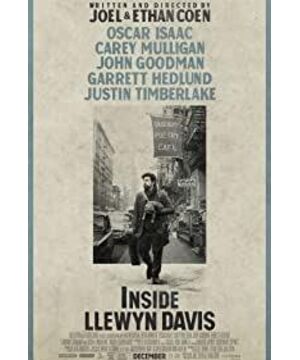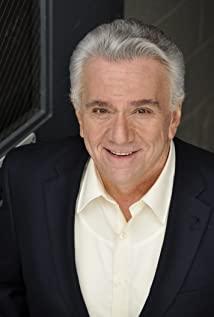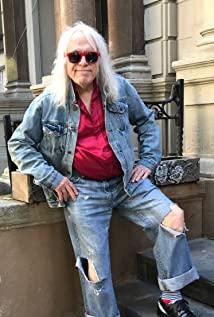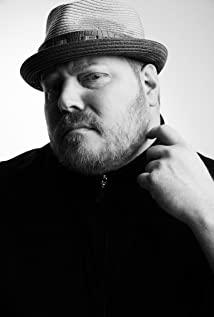Write in front:
Seven years ago, I watched "Drunk Town Folk Ballads" for the first time. I didn't know much about the 1960s, and even more so about music. What I don't know is that maybe it's not the music or the '60s that this movie is trying to tell. During those seven years, I was left with only the soundtrack I knew by heart and forgot about the story. But when I go back to this story again, when I go back to the cruel moments of Llewyn Davis, I find that I never actually forgot about Llewyn Davis. The homeless man came and went in my life, exhausted and exhausted, but refused to compromise with the last ounce of energy, as if that was the only way he was alive. I don't know if the aura flashes only in despair and misery, but those who are favored by the aura have no escape and jump into the abyss of self-torture one after another. Maybe the Coen brothers are stumped for them too?
The story of "Drunken Country Ballads" is about endless repetition, search and return. The Coen brothers planted this repetitive fatality in every detail: the head-to-tail scenes, the recurring cat (and the cat's name was Ulysses), the doomed trip to Chicago. But that's not all. Llewyn is an anti-hero in it, a failed knight who didn't die in battle, but in vain.
It's easy to categorize Llewyn as a loser, and to distance himself from him. In the same way, he is a musician, a depressed lunatic, and a scumbag, which allows us to have a safe distance when we stare at him and observe his life. But maybe we can get closer to him, or we should be closer to him.
"Llewyn is the cat"
Professor Gorfeins' cat is called Ulysses: Ulysses is the heroic Odyssey returning from Troy and the title of James Joyce's classic. Ulysses is a symbol of the point: since the cat followed Llewyn out of the professor's house, one person and one cat have embarked on an Odyssey-style return journey at the same time, but the background of this journey seems to be more like Joyce's Dublin: Chaos , everyday, gloomy. Time goes forward, but both humans and cats want to go back to the starting point.
The Coen brothers want us to be more aware of the parallel relationship between humans and cats: in the phone call Llewyn made to the professor's office, Llewyn said the cat was with him (Llewyn has the cat), and the assistant professor thought he said Yes Llewyn is the cat's name (Llewyn is the cat). We naturally start comparing Llewyn to cats. But the moment the cat escapes from the window of Jean's apartment, their fortunes begin to diverge, and the cat becomes both a frame of reference for Llewyn's life experiences and a lingering bond for Llewyn.
Here, Ulysses the cat is the real hero. He successfully returned home, completed his journey, and regained his grace. The cat's success at the end of the work (maybe we could call it a closure) is a poignant satire on Llewyn's fate. What is Llewyn looking for and where is he going back to? If there is anything he can compare to the happiness that Kitten hopes to look back on, it may be his duet career with his partner Mike, the days of Qin Se and Ming that were written into the record. Yet even that time was shattered with Mike's fall: it was the origin that Llewyn could never reach again, a moment of brilliance like no other. Llewyn's retrospective is thus without cause and effect. Inevitably, he became a "broken record": he was one of the millions imprisoned in time.
But not only that, Llewyn's contradiction is also a common contradiction of idealists, a contradiction between compromise and perseverance. In the early 1960s, Dylan had not yet become a superstar, and the ballad was on the eve of its popularity in the world. Talent was only worth $5, maybe less. In an era when art is unprofitable, most artists who regard sincerity as their career have become martyrs. Didn't Llewyn know he was like that too? He knew that, or he wouldn't have struggled a little when the Gate of the Horn was rejected by Bud Grossman.
Grossman's statement that he was "unprofitable" was an honest comment, mind you, he wasn't saying Llewyn was worthless. Talented people's ego is bigger than the sky, and there must be someone on the ground to help them after the aftermath, and the aftermath needs money. Bud Grossman rejected him, but Llewyn also rejected the option Grossman gave him, a set of rules of the game that would allow him to continue to survive in the circle, and he chose to fight (he thinks) bad taste and capital. This is another battle without cause and effect, a failure that has long been doomed, and he is heading towards this failure without hesitation. In this sense, Llewyn is the opposite of Kitten.
broken mirror
In a movie, not a single soundtrack is placed randomly. In "Five Hundred Miles," Llewyn sits offstage and just learns that Jean is pregnant, and the two of them can't tell if it's remorse, sullen, or tenderness in their eyes. "Please Mr. Kennedy", the recording of this song may give Llewyn food and clothing, but the political satire of the lyrics is full of the contradictory relationship between Llewyn and success and fame. Behind his forced smile is his evil again. Yang wrong place and success wrong shoulder. "The Shoals of Herring", he dedicated to the seafarer's father who had been away from the deck for a long time; now he is tired as if he has returned from fishing in the fierce sea, and he seems to understand his father.
I want to highlight The Death of Queen Jane and Fare Thee Well.
"The Death of Queen Jane," which Llewyn deliberately chose to audition for Bud Grossman, as he always does, was not motivated by any commercial considerations, and presumably not motivated by any success. Queen Jane in the song is the third consort of King Henry VIII, the mother of Edward VI, and was Henry VIII's maid before being named queen. During the production process, Queen Jane had a difficult delivery, and it took at least two days and three nights to give birth to Prince Edward, and the time spent in the delivery room was even longer. Queen Jane died of puerperal fever 12 days after Prince Edward was born. Prince Edward, born by Queen Jane, was the first son of Henry VIII, and he naturally inherited the throne.
The lyrics of the movie version roughly describe the story of Queen Jane's request for a caesarean section to take out the newborn during her difficult labor, but the king refused and eventually died after giving birth. It's hard for me to imagine what Llewyn was thinking of when he sang, the child in Jean's womb, the illegitimate two-year-old child raised by Diane in Akron alone, or the music that he was like his own child— And the creator himself, who was eventually abandoned. And the results speak for themselves. In the end, he just proved that he and his uncompromising values were not accepted by the entertainment industry, and that he was just a nightmare for those girls.
And "Fare Thee Well (Dink's Song)" is also a classic and widely circulated American ballad, which itself describes a southern black woman's longing for her distant husband. The song has been covered by a number of folk superstars, and the solo version in the film largely borrows from Dave von Ronk's arrangement, and is one of the Coen brothers' many tributes to von Ronk's music*. von Ronk's version has a stronger blues feel, and a clear high-pitched tone that he doesn't usually have.
Oscar Isaac inherited his passion from von Ronk's version, and something that might be called "partnership" for now. "Fare Thee Well" is a repertoire of Llewyn and former partner Mike, and for Llewyn, part of Mike is packed into the song, it's Mike's eulogy, and it's a monument to him.
This is not some kind of drama between lovers, but why not? Llewyn and Mike live side by side, musically and obviously spiritually. Who can say that two people who are like twins have no entanglement of love and passion? Mike's departure tore down the last curtain wall between Llewyn and the real world; he used Mike to see and examine himself, and now the mirror is broken.
Of course, we don't know who Mike is or what Llewyn's past is with him, but it's too easy and too self-evident to attribute Llewyn's failure to his own vulnerability and neuroticism. On the other hand: the intertextuality of these songs and the plot of the film presumably ends up expressing parts of Llewyn's world that cannot be expressed by events or words. These songs are all fragments of a mirror.
The Mayor of MacDougal Street
Dave von Ronk was the inspiration for the character of Llewyn Davis, and his story is indeed much richer than Llewyn's. As the leader of the Greenwich folk revival in the 1950s and 1960s, von Ronk's style was integrated, including blues, bluegrass, jazz, folk songs, and gospel. It's hard to beat any other singer. Terri Thal, his ex-wife and manager, recalls working on his hospital bed until the last minute. von Ronk once supported and inspired Dylan's creation, but his own influence for a long time only stayed in the circle and some hardcore fans.
von Ronk was also a seaman before he set foot in the music industry, and Llewyn's experience in the film fits in well with that. He once joined the Fourth International in the United States and participated in a concert commemorating the assassination of Chilean President Allende in 1974. It's worth mentioning that he was one of 13 people arrested in the "Stonewall" incident in 1969, but he didn't even come to the protest: he just happened to be eating nearby, happened to see the parade, and participated in the protest. The parade, and happened to be caught by the police. His shadow shuttled through the volatile second half of the 1920s.
von Ronk's ex-wife Terri Thal, in an opinion piece after the release of "The Ballad of Drunken Country," accused the film of not properly depicting the musical scene in Greenwich at the time, and that the character of Llewyn Davis was completely unrepresentative of von Ronk. von Ronk was a link between the past and the next in American folk music, dubbed "The Mayor of MacDougal Street" by Greenwich musicians—he supported artists throughout his life. In this way, Llewyn is certainly not an incarnation of von Ronk, but rather an inaccurate reimagining of a part of von Ronk's life.
Despite Terri Thal's many complaints about the film, one comment in her article is accurate: "The movie portrays someone who shuns 'success,' or is shunned by 'success' (...the movie portrays someone who eluded success — or whom success eluded)." I don't want to see Llewyn as a loser, I'd rather see him as a "success eluded person", and in the future in the movie, he now swallows There will be some kind of antidote to the bitter fruit. I'll keep coming back to Llewyn Davis, and I can't deny the indescribable beauty of his contradictions.
*The song Llewyn practiced while waiting for Bud Grossman at the Gate of the Horn in the movie was "Cocaine Blues" by Dave von Ronk, "Hang me, Oh Hang me" at the beginning and end of the film, and "Green, Green Rocky Road" at the end of the film is also from Dave von Ronk. Llewyn's solo record "Inside Llewyn Davis", the name and cover design are also completely copied Dave von Ronk's "Inside Dave von Ronk".
View more about Inside Llewyn Davis reviews











